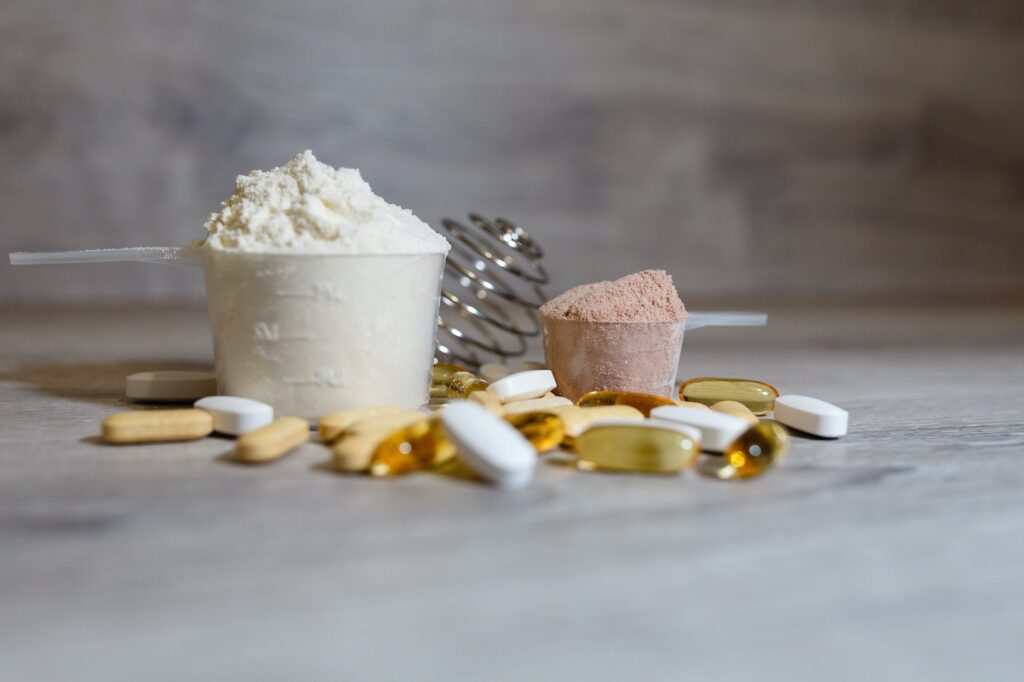
With the awakening of global health awareness and the popularization of fitness culture, the sports nutrition market is experiencing unprecedented rapid growth.
Market data shows that the global sports nutrition market will reach US$24.56 billion in 2022 and is expected to climb to US$37.88 billion by 2027 at a compound annual growth rate of 8.3%. This growth trend stems from consumers’ pursuit of a healthy lifestyle and more and more young people paying attention to fitness, chronic disease prevention and personalized nutrition.
Relevant data show that sports nutrition products have penetrated from professional fitness channels (such as gyms) to mainstream retail markets such as pharmacies and supermarkets, and occupy an important share of online sales.
Top Sports Nutrition Ingredients in 2025
As the sports nutrition market continues to expand, more and more fitness enthusiasts and athletes are beginning to pay attention to functional and scientifically proven nutrients. Here are some of the most popular sports nutrition ingredients in 2025 and their main advantages.
BCAA (Branched-Chain Amino Acids)
BCAA are a complex of three essential amino acids: leucine, isoleucine, and valine. These amino acids play a key role in protein synthesis, especially in muscle repair and growth after exercise.
In addition, relevant evidence shows that BCAA can effectively reduce exercise-induced muscle breakdown, shorten recovery time, and help improve endurance. It is one of the most popular categories in “amino acids for athletes”.
L-Arginine
L-Arginine is a semi-essential amino acid that generates NO through the nitric oxide synthase pathway, promoting vasodilation and improving blood flow and oxygen delivery.
During training, this mechanism helps deliver more oxygen and nutrients to the muscles, which not only enhances the “pump”, but also improves endurance performance and training efficiency.
Creatine
Relevant scientific studies have shown that creatine is one of the most effective sports supplements by increasing the creatine phosphate reserve in the muscles and promoting ATP resynthesis, thereby providing additional energy for high-intensity, short-duration exercise (such as weightlifting and sprinting).
In addition, creatine can promote muscle cell hydration, help increase muscle volume, and indirectly support protein synthesis.
L-Glutamine
L-glutamine is the most abundant free amino acid in human muscle, accounting for more than 60% of the total free amino acids in muscle. It plays multiple important roles in exercise recovery, immune support and muscle protection.
After high-intensity training, L-glutamine helps inhibit muscle breakdown and promote recovery, especially in muscle damage repair and reducing training-induced fatigue.
Protein Powders
Whey protein: quickly absorbed, rich in essential amino acids (such as leucine), stimulates muscle protein synthesis, and is suitable for immediate supplementation after training.
Casein: slowly digested, continuously releases amino acids, reduces muscle breakdown, and is suitable for supplementation before bed.
Protein powder is one of the most common forms of “amino acids for muscle growth” supplementation, suitable for various training goals and time nodes.
Sports Supplements: Key Market Trends & Insights
In recent years, with the improvement of global health awareness and the widespread spread of fitness culture, sports supplement trends have shown significant growth momentum. So, what are the main factors driving the expansion of the sports nutrition ingredients market?
Functional Demand Drives Market Growth
With the improvement of health awareness and a fast-paced lifestyle, consumers are increasingly favoring functional supplements, especially in anti-fatigue, endurance and accelerated recovery.
Therefore, ingredients with clear physiological effects (such as BCAA, creatine, L-glutamine) are becoming more and more popular.
Expansion From Competitive Sports To Mass Fitness
Sports nutrition products have broken through the limitations of professional athletes and penetrated into the general consumer group.
More and more fitness beginners, office workers and middle-aged and elderly people are also beginning to pay attention to products such as protein powder, branched-chain amino acids and energy enhancers. This will drive the growth of the entire sports nutrition market and enable sports nutrition to move from a niche market to mainstream health consumption.
Ingredient Transparency And “Clean Label” Demand
Consumers are increasingly concerned about the purity, source and formula transparency of products, which has driven more and more brands to launch “no additives”, “non-GMO” and “plant ingredients” sports supplements.
For example, plant-based proteins (such as pea protein) and natural ingredients (such as ginseng and maca) have significantly increased their market share because they are in line with the concept of sustainability.
Digitalization And Personalization Drive Consumption Upgrades
Wearable devices (such as smart watches, heart rate monitors) and AI-driven fitness apps (such as Keep and Hyrox) are driving the personalized development of sports nutrition. Through real-time data (sleep, heart rate variability, etc.), consumers can customize dynamic supplement plans, such as adjusting protein intake or electrolyte supplementation timing according to training intensity.
In addition, brands also meet this refined fitness supplement demand through AI recommendations and customized nutrition combinations.

Guide to Choosing Sports Nutrition Ingredient Suppliers
In recent years, the sports nutrition industry has become increasingly competitive. For sports nutrition supplement manufacturers, choosing a reliable sports nutrition ingredients supplier is crucial to their product quality, brand reputation and market success. Here are a few key factors to consider when choosing a quality supplier:
Raw Material Source And Traceability
A good supplier should provide a clear description of the source of raw materials, covering the origin, extraction method and natural/synthetic properties of the raw materials. Especially when you need “quality amino acids for supplements”, the purity and consistency of the raw materials are particularly critical. A traceable supply chain can effectively reduce quality risks and meet the requirements of regulatory agencies for the source of ingredients.
Production Capacity And Certification Qualifications
When evaluating the production capacity and international certification qualifications of suppliers, it is necessary to focus on whether they have obtained GMP, ISO or FSSC certifications, which are the core basis for measuring their production standardization and quality stability.
For companies that need to purchase in large quantities, the supplier’s delivery cycle and batch supply capacity should also be examined to ensure that there is no risk of supply interruption in long-term cooperation.
Quality Control And Third-Party Testing
Quality control in supplements is an important criterion for evaluating the reliability of suppliers. High-quality suppliers usually have a complete quality control process, including raw material testing, intermediate product monitoring and finished product verification, and are willing to provide third-party test reports. This is particularly critical for “how to choose amino acid supplier” because the quality difference of amino acid ingredients directly affects the product effect.
Supply Chain Stability And Emergency Response Capabilities
Against the background of increasing uncertainty in global logistics, a supplier with a stable supply chain and good inventory management is particularly important. You can examine its contingency plan when raw materials are scarce or international transportation is interrupted to ensure that the cooperative enterprise can continue to operate stably.
Price Competitiveness And Cooperation Flexibility
Although price should not be the only criterion, suppliers with price advantages are undoubtedly more attractive under the premise of ensuring quality. In addition, whether the supplier supports small batch orders and is willing to provide customized services also reflects its cooperation flexibility.
SED Ingredients Ltd specialises in the sale of high quality amino acids, creatine and phytonutrient compounds, ensuring technical documentation and global regulatory support.
Sports Nutrition Ingredient Supply Chain Challenges
The rapid growth of the industry has also brought the following challenges:
- Fluctuating raw material prices due to global sourcing pressures
- Counterfeit or adulterated raw materials from unverified suppliers
- Shipping delays affecting product time to market
- Sustainability issues with synthetic additives
At SED Ingredients Ltd, we address these issues through a robust supplier audit program, multi-warehouse inventory management, and strong partnerships with cGMP-certified factories in Asia.
Summary
Whether you are formulating a pre-workout drink, a post-recovery beverage or an everyday wellness recipe, sourcing from a trusted and certified partner like SED Ingredients Ltd will ensure product success and consumer trust.
